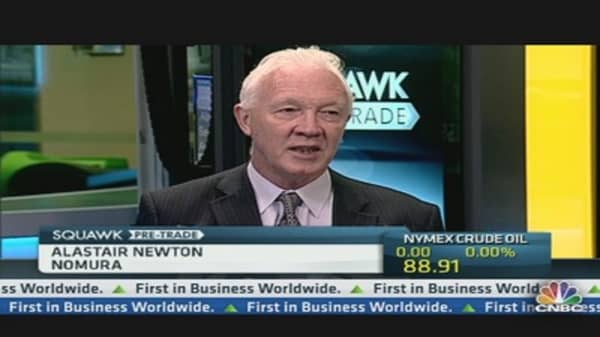European politicians are already heading off to chateaux and caravans across the continent, but this may mean an even tougher challenge when they return to their desks in September.
Markets have focused on the smallest action or promise of action from the European Central Bank (ECB - click herefor an explanation) in recent weeks – the optimism following ECB President Mario Draghi’s promise to do “whatever it takes” to save the euro is a recent case in point - but European politicians are far from off the hook. With trading volumes thin, the slightest eyebrow raise seems to be able to move markets.
“Most of the challenges still rest in the political firmament, not the central banking firmament. The politicians still aren’t doing what they need to do, so the onus rests very heavily on Mr Draghi’s shoulders,” Alistair Newton, senior political analyst at Nomura, told CNBC’s “Squawk Box Europe” Thursday.
“If Draghi doesn’t convince markets that he’s bought time for the politicians, Europe’s politicians will have to cancel their holiday plans and get back to the pumps in Brussels, because this situation could get very serious – on the level of the Russian rouble crisis.”
The Russian rouble crisis of 1998 – also in August - caused markets to plunge around the world. The Dow Jones Industrial Average suffered its second-worst one-day plunge ever in the wake of the crisis.
Gillian Tett of the Financial Times has warned of the danger of the “summer curse” to markets this year.
Recent summers have proven to be especially tricky, with Prime Ministers in Spain and the United Kingdom forced to return from their vacations last August amid trouble at home.
Europe’s problems, and the perceived inaction of its politicians, have been well-documented. The threatened return of recession to the euro zone and the struggle with austerity programs even in healthier economies have led to questions about whether the single currency itself can survive.
Several of the main concerns of the markets are remarkably similar to the same time in 2011: will Spain and/or Italy need a full bailout package; will Greece have to leave the euro and will the Germans be content to foot part of the bill for it all?
“Europe has been in this hole for two and a half years now. Merkel has to get fiscal union long-term – over the next decade. She has to convince first of all, the politicians, but also German voters,” Newton said.
“While there is support in Germany for doing more to save the euro, Greece is still the big issue – and it’s going to come very much to the fore again in September.”
September’s report into Greece’s austerity program by the troika of international creditors: the International Monetary Fund (click here for an explanation; ECB and European Commission, could be a key flashpoint for the crisis, he added.
According to Newton, a negative shock for Spain is the most likely factor to drag politicians away from the poolside this August.
“If Spain has a crisis and the ECB and politicians don’t come up with something, we’ll see Spain frozen out of bond markets and they’ll have three to five weeks to come up with something,” Newton warned.
Paul Donovan, global economist at UBS, pointed out in a recent research note that there is also the danger that with senior politicians catching up on their holiday reading, anything their juniors say will be seized on by markets and the media.
“With the summer holidays in Europe, there is an opportunity for junior politicians to garner increased media coverage – what is known in U.K. media circles as the ‘silly season.’ It is not so much increased political comment, as increased media attention on the political comment that we get which has the potential to create a market response,” Donovan wrote.





